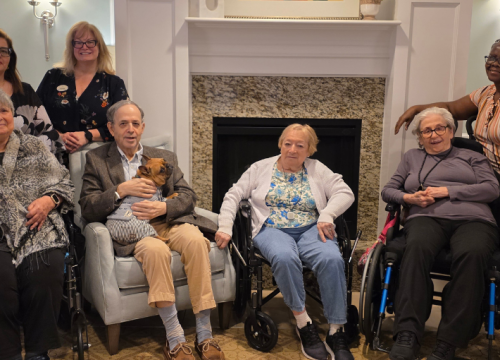3 Essential Resources for 3 Different Kinds of Care Partners

November is National Family Caregivers Month, a time to honor care partners. This year, the Parkinson’s Foundation is highlighting the diverse experiences of caregiving with our theme, “Real Care. Anywhere.”
Care partners are essential members of the care team for people with Parkinson’s disease (PD). However, the way they provide care and support can look different — from sharing a home with someone who has PD to providing care from afar to managing PD alone — caregiving is not one-size-fits-all. We are proud to provide support for all types of care partners. Here are essential resources for three different kinds of care partners:
Everyday Care Partner
An everyday care partner lives with someone who has PD and offers daily support. This can include setting up and attending appointments, helping with medications and navigating day-to-day challenges.
1. Read our Care Partner Guide.
Whether you have been a care partner for a while or are just starting to navigate Parkinson’s disease, this guide is designed for you. It includes practical tips about things like building a support network and planning for the future, along with insights from other care partners and activities and worksheets to support your journey.
2. Check out tips for caring for yourself.
It can be hard to find balance as a care partner, but it is important to remember to care for yourself as well. These tips can help you prevent caregiver burnout, manage stress and build a support system.

3. Find a Parkinson’s support group near you.
In addition to providing a comfortable environment for asking questions and sharing experiences, support groups can lead to lasting friendships. Some groups are for care partners only, while others include care partners and people with PD. Contact our Helpline at 1-800-4PD-INFO (1-800-473-4636) to find one near you.
Caring From Afar
Some care partners live away from their loved ones and offer support from a distance. This type of caregiving can include managing logistics for everyday care, finding ways to coordinate tasks virtually or providing emotional support through regular phone calls and visits.
1. Learn about Parkinson’s.
You will be better able to provide support if you have a basic understanding of PD. Our PD Library is filled with resources to help you learn more about Parkinson’s, being a care partner and managing daily activities and long-term plans.
2. Connect with outside help.
If you are the primary care partner and live away from your loved one, consider hiring someone to help you manage day-to-day care needs. From utilizing your network to finding in-home care providers, know that there are many options available to help you assist your loved one from afar.
3. Get yourself and your loved one connected with a local Parkinson’s Foundation chapter.
Connect with other people with PD and care partners in each of your areas, learn about events and learn more about living well with Parkinson’s together, from a distance.
Solo Care Partner
Many with Parkinson’s care for themselves. This often-overlooked group acts as their own care partner, managing schedules, medications and wellness routines on their own.
1. Join the PD Solo Network.
The PD Solo Network is a virtual network for people with Parkinson’s disease who live alone, by choice or circumstance. This community meets monthly to share ideas, review resources and build relationships.
2. Review the Home Safety Considerations checklist.
Ensure your home is safe and easily accessible. This checklist will help you determine if anything about your home or lifestyle should be adapted to help you live well with Parkinson’s.
3. Remember, our Helpline is always here for you.
Call or email the Parkinson's Foundation Helpline 1-800-4PD-INFO (1-800-473-4636) for answers to your Parkinson’s disease (PD) questions. Our Helpline is answered by PD information specialists who are skilled in providing the right information at the right time.
Real Care Starts Here
No matter what caregiving looks like for you, the Parkinson’s Foundation is here to help.
-
Visit For Care Partners
-
Sign up for free online courses through our Care Partner Program
-
Share your care partner story
Learn how you can celebrate National Family Caregivers Month at Parkinson.org/CaregiversMonth.
Related Materials
My Parent Has Parkinson's. What Does It Mean?
Intimacy and PD
Impulse Control
Related Blog Posts


Start 2026 Strong: Simple Resolutions for Better Health
